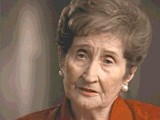You searched for: 叙利亚facebook开户【TG飞机:@bapingseo】代谷歌开户优化推广包上【TG电报:@bapingseo】老挝谷歌搜索推广【Telegram:@bapingseo】麻将官方进入天天稳胆2串1预测星力七代捕鱼软件真人官方网站?8cK2LY/I3oai9.html
<< Previous | Displaying results 961-970 of 991 for "叙利亚facebook开户【TG飞机:@bapingseo】代谷歌开户优化推广包上【TG电报:@bapingseo】老挝谷歌搜索推广【Telegram:@bapingseo】麻将官方进入天天稳胆2串1预测星力七代捕鱼软件真人官方网站?8cK2LY/I3oai9.html" | Next >>
-
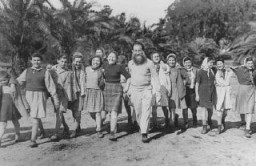
-
The Syrets Labor Education Camp
ArticleSyrets was a labor education camp established by the Germans outside of Kyiv. Learn more about Syrets prisoners and their daily life in the camp.
-
What Groups of People did the Nazis Target?
ArticleJews were the primary targets for mass murder by the Nazis and their collaborators. Nazi policies also led to the brutalization and persecution of millions of others.
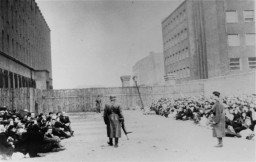
-
The Krakow (Cracow) Ghetto during the Holocaust
ArticleThe Krakow ghetto in German-occupied Poland held over 15,000 Jews. Learn more about Krakow and the ghetto’s history during the Holocaust and WWII.
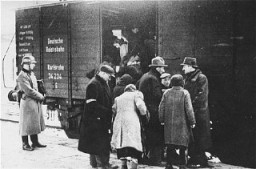
-
"Nuremberg: Its Lesson for Today"
FilmThis footage comes from "Nuremberg, Its Lesson for Today" a 1947 documentary film produced by the US military's Documentary Film Unit, Information Services Division. The film, directed by Pare Lorentz and Stuart Schulberg, shows footage from the trial of Nazi war criminals by the International Military Tribunal. It also intermixes historical footage depicting the founding of the Nazi state, the unleashing of World War II, and Nazi crimes against humanity. The sentencing sequence shown here illustrates the…
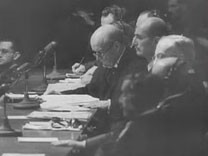
-
Charlene Schiff describes being caught while trying to smuggle food into the Horochow ghetto
Oral HistoryBoth of Charlene's parents were local Jewish community leaders, and the family was active in community life. Charlene's father was a professor of philosophy at the State University of Lvov. World War II began with the German invasion of Poland on September 1, 1939. Charlene's town was in the part of eastern Poland occupied by the Soviet Union under the German-Soviet Pact of August 1939. Under the Soviet occupation, the family remained in its home and Charlene's father continued to teach. The Germans…
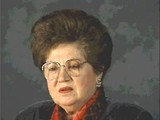
-
Charlene Schiff describes forced labor in the Horochow ghetto
Oral HistoryBoth of Charlene's parents were local Jewish community leaders, and the family was active in community life. Charlene's father was a professor of philosophy at the State University of Lvov. World War II began with the German invasion of Poland on September 1, 1939. Charlene's town was in the part of eastern Poland occupied by the Soviet Union under the German-Soviet Pact of August 1939. Under the Soviet occupation, the family remained in its home and Charlene's father continued to teach. The Germans…
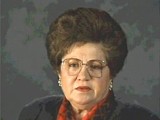
-
Lucine Horn describes her escape from the Majdan Tatarski ghetto
Oral HistoryLucine was born to a Jewish family in Lublin. Her father was a court interpreter and her mother was a dentist. War began with the German invasion of Poland on September 1, 1939. Lucine's home was raided by German forces shortly thereafter. Soon after the German occupation of Lublin, Jews there were forced to wear a compulsory badge identifying them as Jews. A ghetto in Lublin was closed off in January 1942. Lucine survived a series of killing campaigns and deportations from the ghetto during March and…
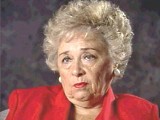
-
Ludmilla Page recalls arriving in Auschwitz instead of Oskar Schindler's munitions factory in Brünnlitz
Oral HistoryLudmilla was born to an assimilated Jewish family in Kishinev, Romania. She and her mother, a physician, were living in Poland when the Germans invaded on September 1, 1939. They were taken to Krakow. Ludmilla was forced to live in the Krakow ghetto; her mother was sent to the Warsaw ghetto. Ludmilla worked in a factory at the Plaszow labor camp for a businessman who was a friend of the German industrialist Oskar Schindler. In October 1944, Schindler attempted to save some Jewish workers by relocating them…
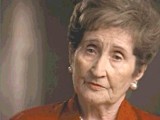
-
Ludmilla Page describes leaving Auschwitz and arriving at the Bruennlitz munitions factory in the Sudetenland
Oral HistoryLudmilla was born to an assimilated Jewish family in Kishinev, Romania. She and her mother, a physician, were living in Poland when the Germans invaded on September 1, 1939. They were taken to Krakow. Ludmilla was forced to live in the Krakow ghetto; her mother was sent to the Warsaw ghetto. Ludmilla worked in a factory at the Plaszow labor camp for a businessman who was a friend of the German industrialist Oskar Schindler. In October 1944, Schindler attempted to save some Jewish workers by relocating them…
